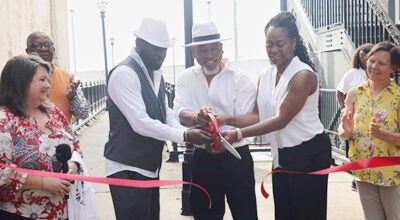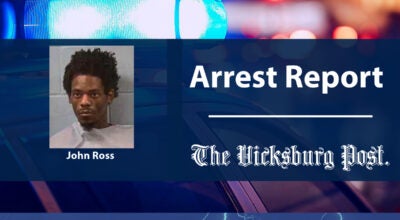Funding fight doesn’t slow pace at dispatching
Published 12:00 am Thursday, November 29, 2001
E-911 Dispatcher Shane Parker writes down an emergency caller’s information as he sends out a dispatch at the same time.(The Vicksburg Post/MELANIE DUNCAN)
[11/30/01]”911. What is your emergency?”
Peggy Wright has repeated that phrase hundreds of times a day for the past eight years. She has even slipped sometimes, answering her home phone that way.
As a supervisory dispatcher for the Vicksburg-Warren 911 Center, she is one of 14 people who answer calls from a horse on the loose to a house fire or multivehicle wreck seven days a week, 24 hours a day.
And the calls don’t stop simply because county and city officials are bickering over the center’s funding.
“We are the first step in the public safety operation. If you have an accident, the house catches on fire, it comes here first. For the sheriff to get to your house, it comes through here,” said Allen Maxwell, new coordinator of the center.
The center, which opened 10 years ago this month, is funded by the city, the county and through a surcharge on telephone bills. Mayor Laurence Leyens has argued that the city taxpayers pay more than their fair share since they pay both city and county taxes. Tuesday, Leyens said the city may pull out of the center if an agreement is not reached with the county.
“This squabble over money is tearing it (911 operations) apart,” said Lynn Marsalis, former director of the 911 center. “The people are going to be the ones to suffer if they can’t get this worked out.”
Yet while the debate continues, dispatchers continue their work serving the city and county from the basement of the new Court House and their effectiveness is not in question.
Clad in navy and khaki uniforms and out of the public’s view, they handle calls amidst banks of computer screens glowing in the darkness and a cacophony of radio dispatches and telephone conversations.
During a 12-hour shift, they are tethered to one of four work stations by a 30-foot cord that allows a walk outside to the breakroom. Like John Cusack as an air traffic controller in the movie “Pushing Tin,” they must navigate a series of computer screens, call-in buttons and radio frequencies as they juggle emergency calls and monitor the whereabouts of all on-duty police officers and sheriff’s deputies. Multi-tasking is critical.
When a call comes in, the CAD system, or Computer Assisted Dispatch, displays vital information the caller’s address, phone number, the closest fire department and sheriff or police department. “That’s why it is Enhanced 911,'” Maxwell explained. “It makes the dispatching so much faster.”
The center is state-of-the-art. “This is as good as it gets, as efficient as it gets,” he said, and it attracts officials from other state agencies who come by to see how it works.
Yet it is the symbiotic relationship between the dispatchers and the emergency response teams they serve that make it successful, Maxwell said. Dispatchers are required to ride with officers, “in order to hear what officers hear on their end,” Wright said. Public safety officers, in turn, visit the center to better understand the dispatchers’ situation.
“It all works as a cohesive unit,” Maxwell said. “We have a state-of-the-art system. But it comes down to the people; whoever pushes that button and says 911.'”
The center handles 2,000 to 3,000 phone calls a week, “for all kinds of reasons,” he said.
To do that, dispatchers are constantly being trained. State certification takes six to 12 months, and each employee must learn CAD codes as well as the “10 codes” such as 10-55 for intoxicated driver that alert responding officers to the situation at hand. Dispatchers also receive Emergency Medical Dispatch training, or EMD, to talk callers through emergency situations while they wait for an ambulance to arrive. In addition, dispatchers are CPR qualified, type at least 35 words per minute, receive computer training and pass an FBI background check.
Beginning pay is $8 an hour.
“This job is not for everyone,” Maxwell said. “When that light is blinking, you have no idea what that call is going to be. It could be the worst disaster in Warren County history or somebody who lost a bicycle.”
Dispatcher Shane Parker recalled a recent incident that bothered him. His shift was up and he was about to leave when he took a call. A girl was with her mother, whom she said had fallen asleep and wasn’t waking up. “I was trying to get her to do CPR when she put the phone down,” he said. He was left with silence, not knowing what was happening on the other end of the line. Later, he found out the girl had called another family member before dialing 911. She had arrived and begun CPR.
“I don’t do it for the money. I do it because I enjoy trying to help people,” he said. But there is pressure. “The knowing somebody needs your assistance.”
“We do get upset on this end, even if we don’t know them,” Wright said. “You do the best you can, but you wonder, could I have gotten them there faster, or did I do everything I could have.”
Then there is the added responsibility of keeping the police officers they serve safe. “I grew up with most of the officers,” said Steven Griffith, who’s been a dispatcher for over a year. “It’s all a big family with us, with the officers. If one gets hurt, we all take it personally.”





